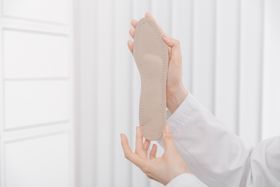Rigid vs. Soft Orthotics for Flat Feet, Plantar Fasciitis, and More
Updated September 19, 2025

While over-the-counter orthotics are typically for general use, custom orthotics are designed for use in managing specific conditions. Because the aim is to address different conditions, they come in different shapes and sizes, and they include metatarsal bars, toe lifts, arch support insoles, and many more.
Since there are different types of custom orthotics in the market, you may be wondering which is best for you and whether you should go for rigid or soft orthotics. Let’s break it down quickly to help you understand how each works.
Classification of Custom Orthotics
Orthotics are classified into three main groups based on the materials from which they are fabricated. These three types are:
- Rigid orthotics Rigid orthotics are used to limit abnormal foot movements. They offer more stability and are often constructed from plastic, carbon fiber, or other rigid materials. Rigid orthotics are harder on the feet and your feet may require some time to adjust.
- Soft orthotics Soft insoles are made of materials like EVA foam and gel. They are the best when the goal is to provide cushion or support, improve shock absorption, increase balance, and pressure relief. Soft orthotics are much more flexible because they flex and bend with your feet.
- Semi-rigid orthotics Semi-rigid insoles are made of composite layers that contain both soft and rigid insole materials. You'll find the cushioning benefits of a soft insole and the motion restriction effect of a rigid insole. It is particularly useful among athletes who have pain during training. Semi-rigid orthotics are also good for flat feet, especially for congenital flat feet.
» In need of custom orthotics for flat feet or plantar fasciitis? Check out the best insoles for flat feet and read our review on custom orthotics for plantar fasciitis
Rigid Custom Orthotics
Rigid orthotics are typically made out of hard plastic material. Because they’re much more solid than softer options, you’ll need some time to adjust to them at first. The great news is that as you wear them, your body eventually gets used to the support and they become quite comfortable.
Pros
- More durable and longer-lasting than soft orthotics
- Will retain its shape over a long time instead of flattening out or becoming compressed
- Can fit easily into fashion footwear or casual shoes
- Does not depend on the stiffness or support of the shoe, as the orthotic will not be influenced by a flexible sole
Cons
- Will take longer to break in than the soft orthotic.
- Can crack if too much force goes through it. May crack or break if high amounts of force go through them
- Can squeak in footwear
Rigid Orthotics for Flat Feet
Rigid orthotics also do tend to work well when attempting to treat plantar fasciitis due to flat feet because they offer necessary rigid arch support and help restrict or control abnormal foot movement to ensure correct alignment.
Rigid orthotics are also recommended for use in cases of:
- Foot, leg, thigh, and lower back pains by sitting flush against your feet and taking the load off
- Achilles tendonitis as they can help support the middle of your foot to reduce strain on that area
- Sesamoiditis treatment
Soft Custom Orthotics
Soft orthotics are exactly that; softer on the feet. They are made from EVA, which can help a lot with uncomfortable or sore spots by taking the pressure off these areas.
Pros
- Provides enough cushion and comfort to the leg
- Takes lesser time to break in and adjust to
- Can provide more padding for arthritic joints
- Most suitable for fashion orthotics as they can adapt to the incline of the shoe
Cons
- More prone to wear and needs to be changed more often
- Depends to a large extent on the nature of the shoe for support
- Can make feet hot and sweaty
- Often bulkier since they will be too flexible otherwise
Soft Arch Support Insoles
Soft orthotics are also recommended for individuals diagnosed with diabetes, arthritis, or foot deformities such as bunions or hammertoes. In these cases, soft orthotics provide necessary cushioning and soft arch support while reducing the pressure on the feet, absorbing shock, and improving balance.
Soft orthotics are also recommended for use in cases of:
- Heel pain because they mold to painful areas, cushion sore spots, and provide additional arch support at the same time
- And for athletes who are involved in high-impact sports like running, basketball, soccer, etc. as they are more flexible, and reduce pain and discomfort.
What's Right for You?
Another great thing about custom orthotics, though, is that you don't have to be the one choosing.
When we make our custom orthotics at Upstep, our expert podiatrists make sure to choose the exact combination of stiff/rigid and soft/cushiony materials to fit your preference and needs. That means you'll always have exactly the right amount of support and flexibility.
Not only that, but they incorporate unique structural properties, like a metatarsal pad or dome under the balls of your feet, a built-in heel raise, heel or forefoot padding, etc. These make sure you'll get even more relief and comfort out of your custom orthotics.
Step into comfort—shop the best custom orthotics now.








